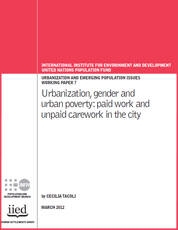This collaborative working paper, and the shorter technical briefing note derived from it, discuss hidden dimensions of urban poverty, and the different ways in which they impact men and women. This gender perspective supports a broader understanding of urban poverty that stretches beyond income to include domestic and care responsibilities, dependency and powerlessness.
The papers explore women’s engagement in both paid work, which is often informal and subject to increasing insecurity and low earnings, and unpaid work, which results in time poverty for women. It also discusses differential access to shelter and basic services and their importance for safety, security and well-being.
In many ways, urbanization is an important and positive transformation, linked to economic growth and a better educated and more productive labour force. It can and should also contribute to greater environmental sustainability through more efficient use of resources, and to improved social welfare through better access to services. But this can only be achieved by policies and planning that use a gendered perspective to look at various aspects of urban poverty.

The papers explore women’s engagement in both paid work, which is often informal and subject to increasing insecurity and low earnings, and unpaid work, which results in time poverty for women. It also discusses differential access to shelter and basic services and their importance for safety, security and well-being.